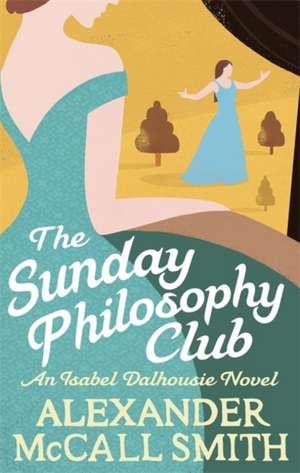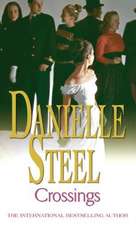The Sunday Philosophy Club: Isabel Dalhousie Novels
Autor Alexander McCall Smithen Limba Engleză Paperback – 7 feb 2013
| Toate formatele și edițiile | Preț | Express |
|---|---|---|
| Paperback (2) | 48.26 lei 3-5 săpt. | +23.98 lei 4-10 zile |
| Little Brown Book Group – 7 feb 2013 | 48.26 lei 3-5 săpt. | +23.98 lei 4-10 zile |
| Anchor Books – 30 iun 2005 | 84.57 lei 3-5 săpt. |
Preț: 48.26 lei
Preț vechi: 63.44 lei
-24% Nou
Puncte Express: 72
Preț estimativ în valută:
9.24€ • 9.61$ • 7.62£
9.24€ • 9.61$ • 7.62£
Carte disponibilă
Livrare economică 24 martie-07 aprilie
Livrare express 07-13 martie pentru 33.97 lei
Preluare comenzi: 021 569.72.76
Specificații
ISBN-13: 9780349139418
ISBN-10: 0349139415
Pagini: 304
Dimensiuni: 131 x 199 x 19 mm
Greutate: 0.21 kg
Editura: Little Brown Book Group
Seria Isabel Dalhousie Novels
ISBN-10: 0349139415
Pagini: 304
Dimensiuni: 131 x 199 x 19 mm
Greutate: 0.21 kg
Editura: Little Brown Book Group
Seria Isabel Dalhousie Novels
Notă biografică
Alexander McCall Smith is the author of the huge international phenomenon, The No. 1 Ladies' Detective Agency, and The Sunday Philosophy Club series. He was born in what is now known as Zimbabwe and he was a law professor at the University of Botswana and at Edinburgh University. He lives in Scotland, where in his spare time he is a bassoonist in the RTO (Really Terrible Orchestra).
Extras
Chapter One
Isabel Dalhousie saw the young man fall from the edge of the upper circle, from the gods. His flight was so sudden and short, and it was for less than a second that she saw him, hair tousled, upside down, his shirt and jacket up around his chest so that his midriff was exposed. And then, striking the edge of the grand circle, he disappeared headfirst towards the stalls below.
Her first thought, curiously, was of Auden's poem on the fall of Icarus. Such events, said Auden, occur against a background of people going about their ordinary business. They do not look up and see the boy falling from the sky. I was talking to a friend, she thought. I was talking to a friend and the boy fell out of the sky.
She would have remembered the evening, even if this had not happened. She had been dubious about the concert-a performance by the Reykjavik Symphony, of which she had never heard-and would not have gone had not a spare ticket been pressed upon her by a neighbour. Did Reykjavik really have a professional symphony orchestra, she wondered, or were the players amateurs? Of course, even if they were, if they had come as far as Edinburgh to give a late spring concert, then they deserved an audience; they could not be allowed to come all the way from Iceland and then perform to an empty hall. And so she had gone to the concert and had sat through a first half which comprised a romantic combination of German and Scottish: Mahler, Schubert, and Hamish McCunn.
It was a warm evening-unseasonably so for late March-and the atmosphere in the Usher Hall was close. She had come lightly dressed, as a precaution, and was glad that she had done so as the temperature in the grand circle inevitably climbed too high. During the interval she had made her way downstairs and had enjoyed the relief of the cooler air outside, eschewing the crush of the bar with its cacophony of conversation. She would find people she knew there, of course; it was impossible to go out in Edinburgh and not see anybody, but she was not in the mood for conversation that evening. When the time came to go back in, she toyed for a few moments with the idea of missing the second half, but she always felt inhibited from any act suggesting a lack of concentration or, worse still, of seriousness. So she had returned to her seat, picked up the programme from where she had left it on the armrest next to her, and studied what lay ahead. She took a deep intake of breath. Stockhausen!
She had brought with her a set of opera glasses-so necessary even in the moderate heights of the grand circle. With these trained on the stage so far down below, she scrutinised each player one by one, an activity she could never resist in concerts. One did not stare at people through binoculars normally, but here in the concert hall it was permitted, and if the binoculars strayed to the audience once in a while, who was to notice? The strings were unexceptional, but one of the clarinettists, she noticed, had a remarkable face: high cheekbones, deep-set eyes, and a chin that had been cleaved, surely, by an axe. Her gaze dwelt on him, and she thought of the generations of hardy Icelanders, and Danes before them, that had laboured to bring forth this type: men and women who scratched a living from the thin soil of upland farms; fishermen who hunted cod in steel-grey waters; women who struggled to keep their children alive on dried fish and oatmeal; and now, at the end of all this effort, a clarinettist.
She laid aside the opera glasses and sat back in her seat. It was a perfectly competent orchestra, and they had played the McCunn with gusto, but why did people still do Stockhausen? Perhaps it was some sort of statement of cultural sophistication. We may come from Reykjavik, and it may be a small town far from anywhere, but we can at least play Stockhausen as well as the rest of them. She closed her eyes. It was impossible music, really, and it was not something a visiting orchestra should inflict on its hosts. For a short while she considered the idea of orchestral courtesy. Certainly one should avoid giving political offence: German orchestras, of course, used to be careful about playing Wagner abroad, at least in some countries, choosing instead German composers who were somewhat more . . . apologetic. This suited Isabel, who disliked Wagner.
The Stockhausen was the final item on the programme. When at last the conductor had retired and the clapping had died down-not as warm as it might have been, she thought; something to do with Stockhausen-she slipped out of her seat and made her way to the ladies' room. She turned on a tap and scooped water into her mouth-the Usher Hall had nothing so modern as a drinking fountain-and then splashed some on her face. She felt cooler, and now made her way out onto the landing again. It was at this point, though, that Isabel caught sight of her friend Jennifer standing at the bottom of the short flight of stairs that led into the grand circle.
She hesitated. It was still uncomfortably warm inside, but she had not seen Jennifer for over a year, and she could hardly walk past without greeting her.
Isabel made her way through the crowds.
"I'm waiting for David," Jennifer said, gesturing towards the grand circle. "He lost a contact lens, would you believe it, and one of the usherettes has lent him a torch to go and look for it under his seat. He lost one on the train through to Glasgow and now he's done it again."
They chatted as the last of the crowd made its way down the stairs behind them. Jennifer, a handsome woman, in her early forties-like Isabel-was wearing a red suit on which she had pinned a large gold brooch in the shape of a fox's head. Isabel could not help but look at the fox, which had ruby eyes, and seemed to be watching her. Brother Fox, she thought. So like Brother Fox.
After a few minutes, Jennifer looked anxiously up the stairs.
"We should go and see if he needs help," she said irritably. "It'll be an awful nuisance if he's lost another one."
They took a few steps up the short set of stairs and looked down towards the place where they could make out David's back, hunched behind a seat, the light of the torch glinting between the seating. And it was at that moment, as they stood there, that the young man fell from the layer above-silently, wordlessly, arms flailing as if he were trying to fly, or fend off the ground-and then disappeared from view.
For a brief moment they stared at each other in mutual disbelief. And then, from below, there came a scream, a woman's voice, high-pitched; and then a man shouted and a door slammed somewhere.
Isabel reached forward and seized Jennifer's arm. "My God!" she said. "My God!"
From where he had been crouching, Jennifer's husband straightened up. "What was that?" he called to them. "What happened?"
"Somebody fell," said Jennifer. She pointed at the upper circle, at the point where the top layer joined the wall. "From up there. He fell."
They looked at one another again. Now Isabel moved forward to the edge of the circle. There was a brass rail running along the parapet, and she held on to this as she peered over.
Below her, slumped over the edge of a seat, his legs twisted over the arms of the neighbouring seats, one foot, she noticed, without a shoe, but stockinged, was the young man. She could not see his head, which was down below the level of the seat; but she saw an arm sticking up, as if reaching for something, but quite still. Beside him stood two men in evening dress, one of whom had reached forward and was touching him, while the other looked back towards the door.
"Quickly!" one of the men shouted. "Hurry!"
A woman called out something and a third man ran up the aisle to where the young man lay. He bent down and then began to lift the young man off the seat. Now the head came into view, and lolled, as if loosened from the body. Isabel withdrew and looked at Jennifer.
"We'll have to go down there," she said. "We saw what happened. We had better go and tell somebody what we saw."
Jennifer nodded. "We didn't see much," she said. "It was over so quickly. Oh dear."
Isabel saw that her friend was shaking, and she put an arm about her shoulder. "That was ghastly!" she said. "Such a shock."
Jennifer closed her eyes. "He just came down . . . so quickly. Do you think he's still alive? Did you see?"
"I'm afraid he looked rather badly hurt," said Isabel, thinking, It's worse than that.
They went downstairs. A small crowd of people had gathered round the door into the stalls and there was a buzz of conversation. As Isabel and Jennifer drew near, a woman turned to them and said: "Somebody fell from the gods. He's in there."
Isabel nodded. "We saw it happen," she said. "We were up there."
"You saw it?" said the woman. "You actually saw it?"
"We saw him coming down," said Jennifer. "We were in the grand circle. He came down past us."
"How dreadful," said the woman. "To see it . . ."
"Yes."
The woman looked at Isabel with that sudden human intimacy that the witnessing of tragedy permitted.
"I don't know if we should be standing here," Isabel muttered, half to Jennifer, half to the other woman. "We'll just get in the way."
The other woman drew back. "One wants to do something," she said lamely.
"I do hope that he's all right," said Jennifer. "Falling all that way. He hit the edge of the circle, you know. It might have broken the fall a bit."
No, thought Isabel, it would have made it worse, perhaps; there would be two sets of injuries, the blow from the edge of the circle and injuries on the ground. She looked behind her; there was activity at the front door and then, against the wall, the flashing blue light of the ambulance outside.
"We must let them get through," said Jennifer, moving away from the knot of people at the door. "The ambulance men will need to get in."
They stood back as two men in loose green fatigues hurried past, carrying a folded stretcher. They were not long in coming out-less than a minute, it seemed-and then they went past, the young man laid out on the stretcher, his arms folded over his chest. Isabel turned away, anxious not to intrude, but she saw his face before she averted her gaze. She saw the halo of tousled dark hair and the fine features, undamaged. To be so beautiful, she thought, and now the end. She closed her eyes. She felt raw inside, empty. This poor young man, loved by somebody somewhere, whose world would end this evening, she thought, when the cruel news was broached. All that love invested in a future that would not materialise, ended in a second, in a fall from the gods.
She turned to Jennifer. "I'm going upstairs quickly," she said, her voice lowered. "Tell them that we saw it. Tell them I'll be back in a moment."
Jennifer nodded, looking about her to see who was in charge. There was confusion now. A woman was sobbing, one of the women who must have been standing in the stalls when he came down, and she was being comforted by a tall man in an evening jacket.
Isabel detached herself and made her way to one of the staircases that led up to the gods. She felt uneasy, and glanced behind her, but there was nobody around. She climbed up the last few stairs, through one of the archways that led to the steeply racked seating. It was quiet, and the lights suspended from the ceiling above were dimmed in their ornate glass bowls. She looked down, to the edge over which the boy had fallen. They had been standing almost immediately below the point at which he had dropped, which enabled her to calculate where he must have been standing before he slipped.
She made her way down to the parapet and edged along the front row of seats. Here was the brass rail over which he must have been leaning before, and there, down on the ground, a programme. She bent down and picked it up; its cover, she noticed, had a slight tear, but that was all. She replaced it where she had found it. Then she bent over and looked down over the edge. He must have been sitting here, at the very end of the row, where the upper circle met the wall. Had he been further in towards the middle, he would have landed in the grand circle; only at the end of the row was there a clear drop down to the stalls.
For a moment she felt a swaying vertigo, and she closed her eyes. But then she opened them again and looked down into the stalls, a good fifty feet below. Beneath her, standing near to where the young man had landed, a man in a blue windcheater looked upwards and into her eyes. They were both surprised, and Isabel leant backwards, as if warned off by his stare.
Isabel left the edge and made her way back up the aisle between the seats. She had no idea what she had expected to find-if anything-and she felt embarrassed to have been seen by that man below. What must he have thought of her? A vulgar onlooker trying to imagine what that poor boy must have seen during his last seconds on this earth, no doubt. But that was not what she had been doing; not at all.
She reached the stairs and began to walk down, holding the rail as she did so. The steps were stone, and spiral, and one might so easily slip. As he must have done, she thought. He must have looked over, perhaps to see if he could spot somebody down below, a friend maybe, and then he had lost his footing and toppled over. It could easily happen-the parapet was low enough.
She stopped halfway down the stairs. She was alone, but she had heard something. Or had she imagined it? She strained her ears to catch a sound, but there was nothing. She took a breath. He must have been the very last person up there, all alone, when everybody else had gone and the girl at the bar on the landing was closing up. That boy had been there himself and had looked down, and then he had fallen, silently, perhaps seeing herself and Jennifer on the way down, who would then have been his last human contact.
From the Hardcover edition.
Isabel Dalhousie saw the young man fall from the edge of the upper circle, from the gods. His flight was so sudden and short, and it was for less than a second that she saw him, hair tousled, upside down, his shirt and jacket up around his chest so that his midriff was exposed. And then, striking the edge of the grand circle, he disappeared headfirst towards the stalls below.
Her first thought, curiously, was of Auden's poem on the fall of Icarus. Such events, said Auden, occur against a background of people going about their ordinary business. They do not look up and see the boy falling from the sky. I was talking to a friend, she thought. I was talking to a friend and the boy fell out of the sky.
She would have remembered the evening, even if this had not happened. She had been dubious about the concert-a performance by the Reykjavik Symphony, of which she had never heard-and would not have gone had not a spare ticket been pressed upon her by a neighbour. Did Reykjavik really have a professional symphony orchestra, she wondered, or were the players amateurs? Of course, even if they were, if they had come as far as Edinburgh to give a late spring concert, then they deserved an audience; they could not be allowed to come all the way from Iceland and then perform to an empty hall. And so she had gone to the concert and had sat through a first half which comprised a romantic combination of German and Scottish: Mahler, Schubert, and Hamish McCunn.
It was a warm evening-unseasonably so for late March-and the atmosphere in the Usher Hall was close. She had come lightly dressed, as a precaution, and was glad that she had done so as the temperature in the grand circle inevitably climbed too high. During the interval she had made her way downstairs and had enjoyed the relief of the cooler air outside, eschewing the crush of the bar with its cacophony of conversation. She would find people she knew there, of course; it was impossible to go out in Edinburgh and not see anybody, but she was not in the mood for conversation that evening. When the time came to go back in, she toyed for a few moments with the idea of missing the second half, but she always felt inhibited from any act suggesting a lack of concentration or, worse still, of seriousness. So she had returned to her seat, picked up the programme from where she had left it on the armrest next to her, and studied what lay ahead. She took a deep intake of breath. Stockhausen!
She had brought with her a set of opera glasses-so necessary even in the moderate heights of the grand circle. With these trained on the stage so far down below, she scrutinised each player one by one, an activity she could never resist in concerts. One did not stare at people through binoculars normally, but here in the concert hall it was permitted, and if the binoculars strayed to the audience once in a while, who was to notice? The strings were unexceptional, but one of the clarinettists, she noticed, had a remarkable face: high cheekbones, deep-set eyes, and a chin that had been cleaved, surely, by an axe. Her gaze dwelt on him, and she thought of the generations of hardy Icelanders, and Danes before them, that had laboured to bring forth this type: men and women who scratched a living from the thin soil of upland farms; fishermen who hunted cod in steel-grey waters; women who struggled to keep their children alive on dried fish and oatmeal; and now, at the end of all this effort, a clarinettist.
She laid aside the opera glasses and sat back in her seat. It was a perfectly competent orchestra, and they had played the McCunn with gusto, but why did people still do Stockhausen? Perhaps it was some sort of statement of cultural sophistication. We may come from Reykjavik, and it may be a small town far from anywhere, but we can at least play Stockhausen as well as the rest of them. She closed her eyes. It was impossible music, really, and it was not something a visiting orchestra should inflict on its hosts. For a short while she considered the idea of orchestral courtesy. Certainly one should avoid giving political offence: German orchestras, of course, used to be careful about playing Wagner abroad, at least in some countries, choosing instead German composers who were somewhat more . . . apologetic. This suited Isabel, who disliked Wagner.
The Stockhausen was the final item on the programme. When at last the conductor had retired and the clapping had died down-not as warm as it might have been, she thought; something to do with Stockhausen-she slipped out of her seat and made her way to the ladies' room. She turned on a tap and scooped water into her mouth-the Usher Hall had nothing so modern as a drinking fountain-and then splashed some on her face. She felt cooler, and now made her way out onto the landing again. It was at this point, though, that Isabel caught sight of her friend Jennifer standing at the bottom of the short flight of stairs that led into the grand circle.
She hesitated. It was still uncomfortably warm inside, but she had not seen Jennifer for over a year, and she could hardly walk past without greeting her.
Isabel made her way through the crowds.
"I'm waiting for David," Jennifer said, gesturing towards the grand circle. "He lost a contact lens, would you believe it, and one of the usherettes has lent him a torch to go and look for it under his seat. He lost one on the train through to Glasgow and now he's done it again."
They chatted as the last of the crowd made its way down the stairs behind them. Jennifer, a handsome woman, in her early forties-like Isabel-was wearing a red suit on which she had pinned a large gold brooch in the shape of a fox's head. Isabel could not help but look at the fox, which had ruby eyes, and seemed to be watching her. Brother Fox, she thought. So like Brother Fox.
After a few minutes, Jennifer looked anxiously up the stairs.
"We should go and see if he needs help," she said irritably. "It'll be an awful nuisance if he's lost another one."
They took a few steps up the short set of stairs and looked down towards the place where they could make out David's back, hunched behind a seat, the light of the torch glinting between the seating. And it was at that moment, as they stood there, that the young man fell from the layer above-silently, wordlessly, arms flailing as if he were trying to fly, or fend off the ground-and then disappeared from view.
For a brief moment they stared at each other in mutual disbelief. And then, from below, there came a scream, a woman's voice, high-pitched; and then a man shouted and a door slammed somewhere.
Isabel reached forward and seized Jennifer's arm. "My God!" she said. "My God!"
From where he had been crouching, Jennifer's husband straightened up. "What was that?" he called to them. "What happened?"
"Somebody fell," said Jennifer. She pointed at the upper circle, at the point where the top layer joined the wall. "From up there. He fell."
They looked at one another again. Now Isabel moved forward to the edge of the circle. There was a brass rail running along the parapet, and she held on to this as she peered over.
Below her, slumped over the edge of a seat, his legs twisted over the arms of the neighbouring seats, one foot, she noticed, without a shoe, but stockinged, was the young man. She could not see his head, which was down below the level of the seat; but she saw an arm sticking up, as if reaching for something, but quite still. Beside him stood two men in evening dress, one of whom had reached forward and was touching him, while the other looked back towards the door.
"Quickly!" one of the men shouted. "Hurry!"
A woman called out something and a third man ran up the aisle to where the young man lay. He bent down and then began to lift the young man off the seat. Now the head came into view, and lolled, as if loosened from the body. Isabel withdrew and looked at Jennifer.
"We'll have to go down there," she said. "We saw what happened. We had better go and tell somebody what we saw."
Jennifer nodded. "We didn't see much," she said. "It was over so quickly. Oh dear."
Isabel saw that her friend was shaking, and she put an arm about her shoulder. "That was ghastly!" she said. "Such a shock."
Jennifer closed her eyes. "He just came down . . . so quickly. Do you think he's still alive? Did you see?"
"I'm afraid he looked rather badly hurt," said Isabel, thinking, It's worse than that.
They went downstairs. A small crowd of people had gathered round the door into the stalls and there was a buzz of conversation. As Isabel and Jennifer drew near, a woman turned to them and said: "Somebody fell from the gods. He's in there."
Isabel nodded. "We saw it happen," she said. "We were up there."
"You saw it?" said the woman. "You actually saw it?"
"We saw him coming down," said Jennifer. "We were in the grand circle. He came down past us."
"How dreadful," said the woman. "To see it . . ."
"Yes."
The woman looked at Isabel with that sudden human intimacy that the witnessing of tragedy permitted.
"I don't know if we should be standing here," Isabel muttered, half to Jennifer, half to the other woman. "We'll just get in the way."
The other woman drew back. "One wants to do something," she said lamely.
"I do hope that he's all right," said Jennifer. "Falling all that way. He hit the edge of the circle, you know. It might have broken the fall a bit."
No, thought Isabel, it would have made it worse, perhaps; there would be two sets of injuries, the blow from the edge of the circle and injuries on the ground. She looked behind her; there was activity at the front door and then, against the wall, the flashing blue light of the ambulance outside.
"We must let them get through," said Jennifer, moving away from the knot of people at the door. "The ambulance men will need to get in."
They stood back as two men in loose green fatigues hurried past, carrying a folded stretcher. They were not long in coming out-less than a minute, it seemed-and then they went past, the young man laid out on the stretcher, his arms folded over his chest. Isabel turned away, anxious not to intrude, but she saw his face before she averted her gaze. She saw the halo of tousled dark hair and the fine features, undamaged. To be so beautiful, she thought, and now the end. She closed her eyes. She felt raw inside, empty. This poor young man, loved by somebody somewhere, whose world would end this evening, she thought, when the cruel news was broached. All that love invested in a future that would not materialise, ended in a second, in a fall from the gods.
She turned to Jennifer. "I'm going upstairs quickly," she said, her voice lowered. "Tell them that we saw it. Tell them I'll be back in a moment."
Jennifer nodded, looking about her to see who was in charge. There was confusion now. A woman was sobbing, one of the women who must have been standing in the stalls when he came down, and she was being comforted by a tall man in an evening jacket.
Isabel detached herself and made her way to one of the staircases that led up to the gods. She felt uneasy, and glanced behind her, but there was nobody around. She climbed up the last few stairs, through one of the archways that led to the steeply racked seating. It was quiet, and the lights suspended from the ceiling above were dimmed in their ornate glass bowls. She looked down, to the edge over which the boy had fallen. They had been standing almost immediately below the point at which he had dropped, which enabled her to calculate where he must have been standing before he slipped.
She made her way down to the parapet and edged along the front row of seats. Here was the brass rail over which he must have been leaning before, and there, down on the ground, a programme. She bent down and picked it up; its cover, she noticed, had a slight tear, but that was all. She replaced it where she had found it. Then she bent over and looked down over the edge. He must have been sitting here, at the very end of the row, where the upper circle met the wall. Had he been further in towards the middle, he would have landed in the grand circle; only at the end of the row was there a clear drop down to the stalls.
For a moment she felt a swaying vertigo, and she closed her eyes. But then she opened them again and looked down into the stalls, a good fifty feet below. Beneath her, standing near to where the young man had landed, a man in a blue windcheater looked upwards and into her eyes. They were both surprised, and Isabel leant backwards, as if warned off by his stare.
Isabel left the edge and made her way back up the aisle between the seats. She had no idea what she had expected to find-if anything-and she felt embarrassed to have been seen by that man below. What must he have thought of her? A vulgar onlooker trying to imagine what that poor boy must have seen during his last seconds on this earth, no doubt. But that was not what she had been doing; not at all.
She reached the stairs and began to walk down, holding the rail as she did so. The steps were stone, and spiral, and one might so easily slip. As he must have done, she thought. He must have looked over, perhaps to see if he could spot somebody down below, a friend maybe, and then he had lost his footing and toppled over. It could easily happen-the parapet was low enough.
She stopped halfway down the stairs. She was alone, but she had heard something. Or had she imagined it? She strained her ears to catch a sound, but there was nothing. She took a breath. He must have been the very last person up there, all alone, when everybody else had gone and the girl at the bar on the landing was closing up. That boy had been there himself and had looked down, and then he had fallen, silently, perhaps seeing herself and Jennifer on the way down, who would then have been his last human contact.
From the Hardcover edition.
Recenzii
"Genial.... Wise.... Glows like a rare jewel." --Entertainment Weekly"The literary equivalent of herbal tea and a cozy fire. . . . McCall Smith's Scotland [is] well worth future visits." --The New York Times"In Mma Ramotswe, [McCall Smith] minted one of the most memorable heroines in any modern fiction. Now, with the creation of Isabel Dalhousie . . . he's done it again. . . . She's such good company, it's hard to believe she's fictional. You finish this installment greedily looking forward to more." --Newsweek"Charmingly told. . . . Its graceful prose shines, and Isabel's interior monologues--meditations on a variety of moral questions--are bemused, intelligent and entertaining." --The Seattle Times"Charmingly told. . . . Its graceful prose shines, and Isabel's interior monologues--meditations on a variety of moral questions--are bemused, intelligent and entertaining." --The Seattle Times"Endearing. . . . Offers tantalizing glimpses of Edinburgh's complex character and a nice, long look into the beautiful mind of a thinking woman." --The New York Times Book Review"Fans of Alexander McCall Smith's No. 1 Ladies Detective Agency novels will delight in this new series, featuring as its heroine the tart-tongued, tartan-clad problem-solver Isabel Dalhousie. The book club will love it." --Life"Whimsical. . . . [A] memorable cast of characters. . . . McCall Smith's assessments of fellow humans are piercing and profound. . . . [His] depictions of Edinburgh are vivid and seamless. . . . His fans . . . are sure to embrace these moral peregrinations among the plaid." --San Francisco Chronicle"A mystery of moral responsibility and manners . . . [with] memorable minor characters, [an] intriguing, troubled heroine, local color and bracing Scottish patter." ??--Newsday"Habit-forming. . . . The Sunday Philosophy Club leaves plenty of time for pondering moral conundrums, the drinking of steaming cups of hot brew (coffee, in this case) and . . . gentle probing into the human condition." --The Oregonian"So believable. . . . The great pleasures of [The Sunday Philosophy Club] have to do with Smith's wry, gentle writing applied to intriguing plots more curious or humorous than dramatic. . . . Precious Ramotswe has found a kindred spirit." --The Columbus Dispatch"Alexander McCall Smith has become one of those commodities, like oil or chocolate or money, where the supply is never sufficient to the demand. . . . [He] is prolific and habit-forming. . . . [His] gift, one of them, is to inspire an eagerness to follow. . . . McCall Smith has done his job. Isabel lives. A series is born." --The Globe and Mail (Toronto)"Like walking down the street with an amazingly literate, thoughtful, witty and self-deprecating friend through a city that friend knows and loves well." --The Times-Picayune (New Orleans)"Skillfully written. . . . Smith's Scotland . . . is a place where a profound, humane intelligence is at work." --New York Daily News"Mr. Smith, a fine writer, paints his hometown of Edinburgh as indelibly as he captures the sunniness of Africa. We can almost feel the mists as we tread the cobblestones." --The Dallas Morning News"Memorable. . . . The Sunday Philosophy Club will delight McCall Smith's existing fans and win him some new ones." --St. Louis Post-Dispatch"Charming. . . . Suspenseful. . . . A pleasant introduction to a woman readers will want to know more about." --Detroit Free Press"A quiet mystery aimed in equal parts at the head and the heart." --The Patriot News (Harrisburg, PA)"Devotees of Smith's No. 1 Ladies' Detective Agency series are certain to enjoy these new people and this new place. . . . To know Isabel Dalhousie is to like and admire her." --Chicago Tribune"Readers will be immediately smitten with the interplay between the philosopher, her tradition-bound housekeeper Grace and her unlucky in-love niece Cat." --Ft. Myers News-Press"An elegant mystery filled not with dead bodies but an air of gentle refinement, intelligence and insight. . . . Isabel is a true original." --Orlando Sentinel






























